

Love of patterns, order may explain mad math skills—and autism link. Public Media for Northern CA. What Neuroscience Can Tell Us About Making Fractions Stick. How Do I Get My Students Over Their Alternative Conceptions (Misconceptions) for Learning. Alexander, P.
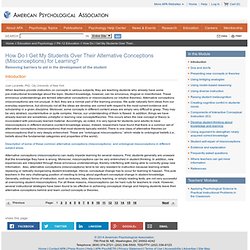
A. (2006). Psychology in learning and instruction. Upper Saddle River, NJ: Pearson Education, Inc. Arnaudin, M., & Mintzes, J. (1985). Students’ alternative conceptions of the hu¬man circulatory system: A cross-age study. Arnaudin, M., & Mintzes, J. (1986). Baxter, J. (1995). Fluency Without Fear - YouCubed. Download PDF By Jo Boaler, Professor of Mathematics Education, co-founder youcubed With the help of Cathy Williams, co-founder youcubed & Amanda Confer, Stanford University. How Reading Novels in Math Class Can Strengthen Student Engagement. During Bezaire’s Curious Incident unit, each period begins with a typical 20-minute math lesson, followed by a 15-minute discussion of the previous day’s reading.
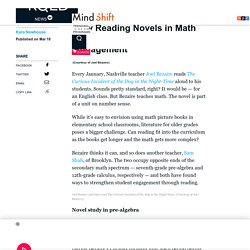
For the rest of the 55-minute period, he reads a new chapter aloud. As he reads, Bezaire often pauses to dig deeper into the story’s math. Sometimes, the concepts align directly with the day’s pre-algebra lesson. For example, on the day when they learn about prime numbers, the class also reads why the main character, Christopher, chose primes as his system for labeling chapters. “The literary hook for this lesson is strong, and kids are really into learning more about primes thanks to the context of the story,” said Bezaire. After class students complete written reflections about the book, with different types of questions serving multiple pedagogical goals. Questions related to plot and language, Bezaire said, help his less confident math students. Others questions invite students to connect personally with the text. Duluth Middle students use STEM concepts to build solar-, battery-powered cars. Duluth Middle sixth-graders, from left, Tyler Jackson, Ezra Meador, Nia Hicks, Fernanda Tecocoatzi-Cisneros, Sophia Conejo-Fuentes and Carole Gilley look on as they participate on Tuesday in a battery-powered car race.
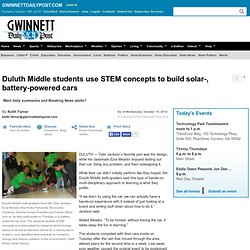
The students studied STEM concepts and were asked to research which energy resource would be the best choice for a community to invest in, and identified best practices to conserve energy and reduce pollution in the environment. Spotlight Q&A: Arthur Levine on Raising the Bar for New Teachers. Arthur Levine has never been shy about expressing his views on teacher education, and specifically what he thinks isn’t working.
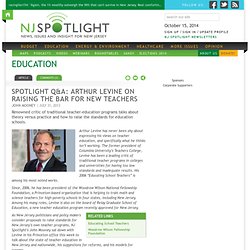
The former president of Columbia University’s Teachers College, Levine has been a leading critic of traditional teacher programs in colleges and universities for having too low standards and inadequate results. His 2006 “Educating School Teachers” is among his most noted works. Since, 2006, he has been president of the Woodrow Wilson National Fellowship Foundation, a Princeton-based organization that is helping to train math and science teachers for high-poverty schools in four states, including New Jersey. Among his many roles, Levine is also on the board of Relay Graduate School of Education, a new teacher education program recently approved for New Jersey. Q: Speak to the state of teacher education and preparation in New Jersey and nationwide. A: The problems of teacher education are the same all over the country. Educating_Teachers_Exec_Summ.pdf. Q. & A. With Arthur Levine. Many critics of these international competitions say it’s unfair to compare test results from homogeneous countries to a diverse country like the United States.
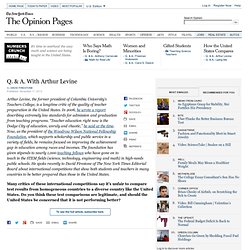
Do you think these test comparisons are legitimate, and should the United States be concerned that it is not performing better? I think the comparisons are important. We live in a world in which our children aren’t competing for jobs against people in the next town — they’re competing for jobs against people in other countries. The Woodrow Wilson Teaching Fellowships. Project-Based Learning. Ten Websites for Science Teachers. We all know that the web is full of excellent web resources for science teachers and students. However, unless you live on the web, finding the best websites can become quite a challenge. This isn't a "Top Ten" list -- instead, it is a list of websites that I either use on a regular basis or just find interesting. From teaching resources for the nature of science and authentic field journals to wacky videos about numbers, I am sure that you will find something in the following list the works for you!
Please share your favorite science web resources in the comment section! 1) Understanding Science UC Berkeley's Understanding Science website is a "must use" for all science teachers. 2) Field Research Journals The Field Book Project from the National Museum of Natural History and the Smithsonian Institution Archives intends to create a "one stop" archive for field research journals and other documentation. 3) Evolution. About — Tinkering School San Francisco. Brightworks: An Extraordinary School. The Arc is the fundamental rhythm of a Brightworks education.
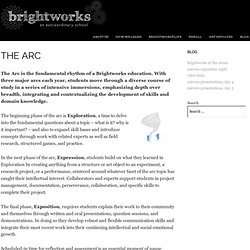
With three major arcs each year, students move through a diverse course of study in a series of intensive immersions, emphasizing depth over breadth, integrating and contextualizing the development of skills and domain knowledge.